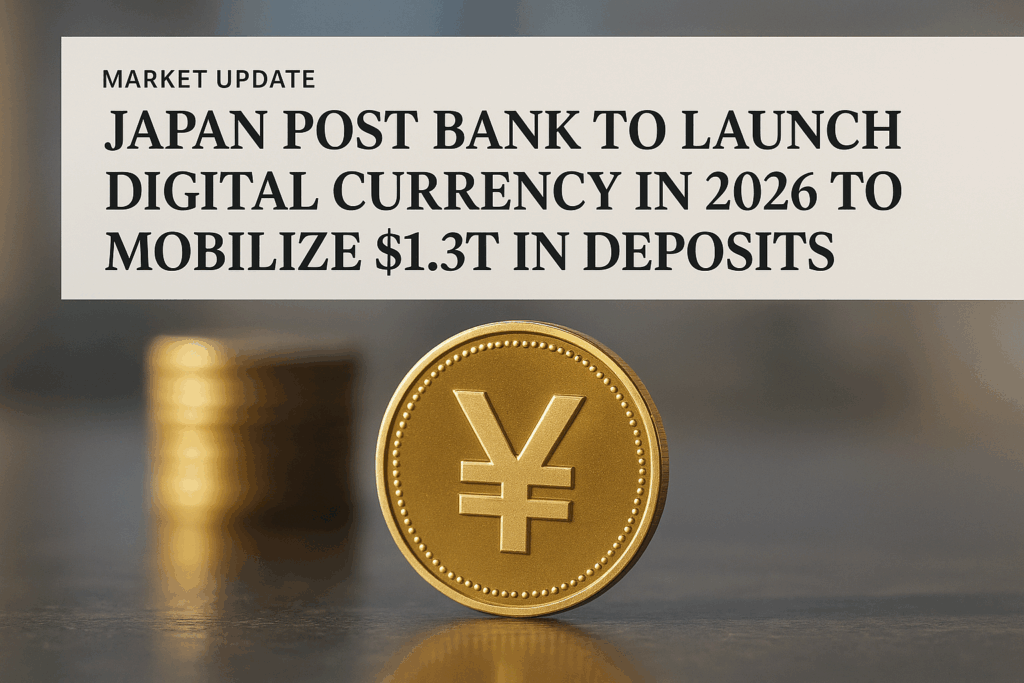Japan Post Bank, the retail banking arm of Japan Post Holdings, has unveiled plans to introduce a proprietary digital currency in 2026, marking a significant step in the nation’s transition toward a blockchain-driven financial ecosystem. With over $1.3 trillion in deposits under management, the bank aims to leverage its vast capital base to unlock new opportunities in digital finance and provide customers with access to faster, more efficient blockchain-enabled services.
Why This Matters
Japan Post Bank’s move is one of the most ambitious efforts by a traditional bank to bridge conventional banking services with digital asset innovation. By creating its own blockchain-powered currency, the institution seeks to:
- Enhance liquidity mobilization of its $1.3 trillion deposit base.
- Facilitate near-instant trading and settlement of blockchain-based assets such as tokenized securities, digital bonds, and other financial products.
- Broaden customer access to emerging digital markets without compromising regulatory compliance or security.
Strategic Objectives
- Mobilizing Dormant Capital: A significant portion of Japan’s household savings is held in bank deposits, often generating low yields. By tokenizing deposits into a digital currency, the bank hopes to channel this capital into more dynamic financial activities.
- Accelerating Blockchain Adoption: Customers will be able to directly use the digital currency for transactions, investments, and possibly cross-border payments, reducing reliance on slower traditional settlement systems.
- Competing Globally: With global peers like JPMorgan (JPM Coin) and China’s central bank (Digital Yuan) already exploring similar ventures, Japan Post Bank’s entry positions Japan firmly in the race for digital currency innovation.
Timeline and Development
The project, slated for rollout in 2026, will require deep collaboration with:
- Japanese financial regulators — to ensure compliance with stringent banking and securities laws.
- Blockchain technology providers — for infrastructure scalability and interoperability.
- Strategic industry partners — including exchanges and fintechs that can integrate the digital currency into wider ecosystems.
The coming year will likely involve pilot testing and regulatory sandbox trials, with gradual scaling to retail and institutional clients.
Market Implications
- For Retail Customers: Faster access to investment products, reduced transaction fees, and easier participation in digital asset markets.
- For Institutional Investors: Enhanced settlement efficiency, tokenized asset offerings, and access to a secure, regulated blockchain-based ecosystem.
- For Japan’s Economy: A step toward revitalizing domestic financial markets, attracting global capital, and modernizing its monetary infrastructure.

Expert Commentary
Analysts suggest that the initiative could reshape capital flows within Japan, given the enormous size of the country’s savings pool. If even a fraction of the $1.3 trillion in deposits transitions into digital assets, it could spark a new wave of liquidity in blockchain-based markets.
“This is not just about convenience—it’s about fundamentally modernizing how money moves in one of the world’s largest economies,” said a Tokyo-based fintech strategist.
The Bigger Picture
The launch aligns with Japan’s broader government-backed initiatives to encourage fintech innovation and digital transformation. With increasing competition from private-sector digital coins, stablecoins, and central bank digital currency (CBDC) pilots, Japan Post Bank’s move demonstrates how traditional banks can remain relevant in a rapidly digitizing global financial system.











